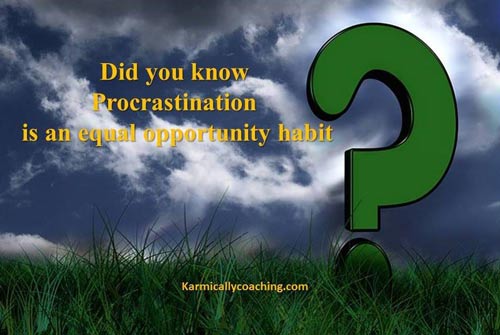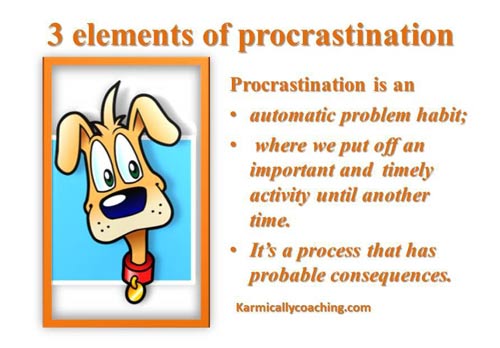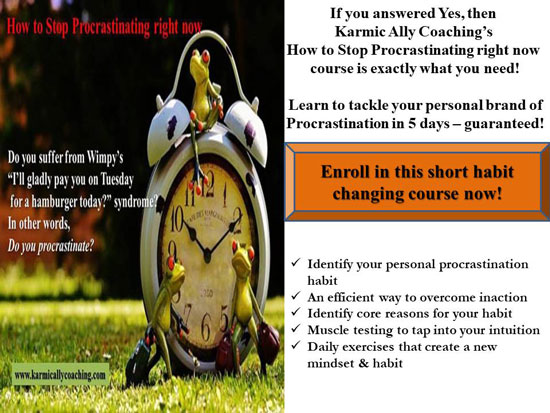This post has already been read 3123 times!

Procrastination is a complex personal challenge. For many, it’s an enigma associated with time management and our inclination to stall important actions ultimately adversely impacting our personal and professional lives.
In my Procrastination Quiz, we looked at different activities to ascertain whether a person was a habitual procrastinator along the deferment spectrum.
The good news is procrastination is a habit and habits can be changed with the right approach and attitude. We have a choice.
Procrastination is an equal opportunity habit that interferes with the productivity of people from every economic level, profession, age, or other demographic category.
That’s what I discovered for myself at Quora where I often answer questions on self-development. This time, there were 2 different people with different demographic profiles who wanted to get rid of their procrastination habit.
One was a student who admitted that he got easily distracted whenever he tried to read or study. His concentration level was less than a few minutes even when he was studying. He wanted tips to overcome this dilemma and find an efficient way to overcome procrastination.
The other person wanted to be a top performer at work. He was aware of the fact that when work got too hard, he’d cop out and enjoyed procrastinating. He wanted to change this time wasting behavior.
Practically everyone has at least 1 or more serious procrastination challenge to meet, especially workplace procrastination.
Procrastination is multifaceted
It’s more than a delay tactic. The concept isn’t as simple as you might think. There are 3 elements that make up procrastination and both readers who had asked for advice demonstrated these elements.
I mentioned earlier that procrastination was a habit. To be clearer, procrastination is an automatic problem habit; where we put off an important and timely activity until another time. It’s a process that has probable consequences.

We procrastinate because we have a negative perception about an anticipated activity.
This creates an urge to diverge by substituting something less relevant, and our procrastination is more often than not accompanied with thinking of justifications to delay action.
The decision to delay action brings immediate relief and hope but also reinforce the procrastination decision, making other procrastination decisions more likely in the future.
Have you ever had to do an important task and thought, “I’ll do this later when I feel ready.”? Or suddenly realized you have to take the dog for a walk, wash dishes or start cleaning the desk?
You’ve procrastinated and avoided the task. You can justify the urgency of the substituted tasks till the cows come home but the truth is, you’ve postponed the more important task.
More than a simple act of avoidance, procrastination involves a process of interconnected perceptions and thoughts, emotions and sensations and actions.
Choice comes into play when you recognize that you can either take corrective action or do nothing and hope for the best.
What’s an efficient way to overcome procrastination?
Procrastination is often a sign of deeper problems and useful in avoiding things that we know we need to do but want to justify not doing them. I don’t know anyone who chooses to develop a procrastination habit. If you are unsure try this Procrastination Quiz
Recognizing the tendency to procrastinate, for whatever reason, is half the battle.
Then it’s time to analyze the specific situations where you procrastinate and ask yourself some hard questions. What is the trigger for the procrastination?
It certainly isn’t a challenging task but some underlying reason. Is it fear of failure, perfectionism or a secondary benefit or pay-off? We procrastinate to put off things that make us uncomfortable.
Once you know the true underlying cause for procrastination and the key area where your exhibit this behavior, you can move forward and turn yourself into a top performer.
Perhaps better planning and chunking down tasks to acceptable bytes and building in some relaxation time might help as a starting point.
Think along those lines and then create a doable action plan to overcome your procrastinating tendencies.
I’ve found the Pomodoro technique to be useful when work feels like a huge mountain in front of me. You can learn more in my post Can a Tomato improve your Time Management?
Ultimately change is a choice, and it is our responsibility to take corrective action.
However change is also a process and is a habit that keeps us in our comfort zone. Would you like to change this inefficient and productivity reducing habit?
I suggest you take the How to Stop Procrastinating right now micro-course. Click here for the details or on the image below. The course is housed on my Karmic Ally Coaching Training website.
Do you know why you procrastinate on some actions and breeze through others? How do you keep this habit in check?
Do share your tips and experience in the comments section below.




 I adhere to the Certified Coaches Alliance Code of Ethics and Standards. A copy is available on request.
I adhere to the Certified Coaches Alliance Code of Ethics and Standards. A copy is available on request.
 Let's Talk through the Connect Form:
Let's Talk through the Connect Form:
For me, procrastination has always been about avoidance. It may be important but I either don’t want to allocate the time or the energy to solve the problem. Recently, someone wrote about coming from the perspective of curiosity. That has been a motivator for me to change how I look at things. “I’m curious about this, how can I make it work?”
Reframing to bring curiosity into the picture when procrastinating on a task is a great way to take resistance out of the picture, Joyce. Thanks for sharing your tip!
Well said! I remember when I was working as a small business coach and a client would say to me about an assignment “I just didn’t have time” … what I heard was “It just wasn’t important enough” because in the end what we do is all about priorities.
For the most part, I’m not a procrastinator, but I am human so occasionally I will find myself stalling and when that happens I take a time out and ask myself, “Okay, what’s really going on here?!” So yes, I absolutely agree with your point about the importance of identifying the underlying cause. Thanks for the reminder and inspiration!
Could have been priorities or even the fear of telling the coach that they needed more help, Marquita. Yes, it is about priorities and we always make time for what we believe is important.
I love the way you ask yourself about what’s really going on. A good way to address the real issue and then do something about it. Awesome!
Normally, I do not have too many procrastination issues. Its more like I need to hold the reins back cause I jump in too quick. I am learning to slow it down! xoxo
Oh boy, I must write a post about that too, Natasha! 🙂 I have addressed the 5 times when procrastination is healthy but to slow down an anti-procrastinator? Hmmmmmmm
Although I am not generally a procrastinator either, there are times when I do ‘wait’ until I’ve had a good night’s sleep or until i feel more like diving into a task that I don’t find overly creative. My experience of myself, is that when I really want something, I go for it. Whether I know how to do it, or not. I also realize there are some tasks that I don’t have to do, as isn’t that what delegating or hiring other people to do them for us is about? For many years I literally tried to do everything myself and my health paid the price. Now I know that my energy and time can be used more wisely, so I might put off something that needs to be done, until I find the perfect person to assign that too. Thanks, Vatsala, for giving us all the opportunity to look more closely at ourselves and to see if we have any procrastinating tendencies.
As long as we get our most important work done, we are fine, Beverley. Deferring the task for a time when we are rested but then doing the task is what matters. You’ve observed a very important area where we often procrastinate because we may not have the know how and the thought of having to do it or learn to do it kicks in the automatic resistance. Delegating the task to someone with the right skills is a good option rather than not doing it.
I’ve taken the quiz and I’m not usually a procrastinator when it comes to jobs, but I have noticed a tendency to put off things I really want to do until I have done everything I think I have to do. This often results in me not getting the chance to do what I want as other work keeps piling in. It’s like I’m saving the best for last – a reward that I never get the chance to enjoy.
People, especially women who are looking after others have a tendency to procrastinate when it comes to their own needs, Tamuria. Making self-care needs to be a priority task on our To Do List so that we can then function optimally in completing the other tasks.
Overall I am not a procrastinator I’d say, however, your blogs have me looking to see if this is accurate. What I have noticed is that unpleasant or difficult tasks seem to get done last. This is not a good plan as I’m more likely to be tired after accomplishing many other tasks. The one task I find myself postponing is my blog draft, so after I published this weeks blog, I set out to outline next weeks. That is as far as I got. I returned to it only to set it aside again.
Your 3 points definitely apply here as this is my habit. What to do, what to do?
When we notice that we are procrastinating over a particular task, especially a difficult one, it helps to break it down to byte size actions and commit time to each byte. I go into this in greater detail in my course Freedom from Procrastination.
In the case of the blog posts, there may be another reason. Perhaps creative fatigue? Coming up with new content can exhaust even the most prolific blogger and often, it helps to take a break of a week or change one’s schedule from 4 posts in a month to 1 post every fortnight. You are much ahead of the game than you might believe, Roslyn. Creating outlines is one of the most important parts of creating good content posts Kudos!
I really appreciate your insight that procrastination is a multi-faceted thing and can mean different things to different people. For me, procrastination is often related to confidence about a task, or lack thereof. So, something that seems ‘tech-y’ to me is something I tend to want to procrastinate about. I handle this by scheduling it for when I am fresh and ready to tackle the task, usually in the morning, because I know if I do it when I’m tired I’ll have no patience if any complications arise – not a good scene! If I wait til the morning, it usually takes about 10 minutes to complete the job, so, by waiting until I have the right energy for the job, I am also gaining confidence in my ability to tackle these kinds of tasks. Win-win!
There can be many reasons why we procrastinate and the reason can be different for different tasks but the main issue is avoidance of the unpleasant task. In the same vein, sometimes procrastination is healthy when we know the task is going to be challenging and we are only deferring it till such time as we are rested and in the right frame of mind to complete the task. The problem starts when we keep finding excuses to further delay starting the task. I think quite a few of us defer techy tasks until we have time to tackle it and manage gremlins that might decide to visit. 🙂